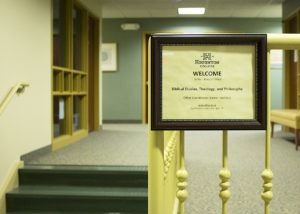Two new professors, Heidi and John Giannini, and their toddler daughter Gloria, joined Houghton’s philosophy department this semester.
Prof. Heidi Giannini graduated from Houghton in 2006, with a major in philosophy and a minor in literature, before earning her Ph.D. in philosophy from Baylor University. Prof. John Giannini attended St. Olaf College in Minnesota, where he majored in computer science and philosophy, and then also earned a Ph.D. in philosophy from Baylor.
 The Profs. Giannini bring a wide range of expertise to the philosophy department. Prof. Heidi Giannini specializes primarily in ethics. She said, “I am very interested in questions about right and wrong, good and evil. One of my primary interests is in how we ought to respond to moral wrongdoing. Thus, much of my research concerns forgiveness, anger, and grace.” These pursuits have also lead her to acquire, as she said, “an interest in early modern French philosophy, in part because of debates on the nature of grace involving figures like Pascal, Arnauld, Malebranche, and (though not French) Leibniz.” Prof. John Giannini’s interests include philosophy of language (questions about how language works and the relationship between language and reality) and philosophy of religion (questions about the nature of God, religious belief, and related topics). His research has focused what philosophers call the principle of charity, which relates to the interpretive assumptions we should make about someone else’s writing.
The Profs. Giannini bring a wide range of expertise to the philosophy department. Prof. Heidi Giannini specializes primarily in ethics. She said, “I am very interested in questions about right and wrong, good and evil. One of my primary interests is in how we ought to respond to moral wrongdoing. Thus, much of my research concerns forgiveness, anger, and grace.” These pursuits have also lead her to acquire, as she said, “an interest in early modern French philosophy, in part because of debates on the nature of grace involving figures like Pascal, Arnauld, Malebranche, and (though not French) Leibniz.” Prof. John Giannini’s interests include philosophy of language (questions about how language works and the relationship between language and reality) and philosophy of religion (questions about the nature of God, religious belief, and related topics). His research has focused what philosophers call the principle of charity, which relates to the interpretive assumptions we should make about someone else’s writing.
These interests are well represented by the courses the Gianninis are teaching this fall. Prof. Heidi Giannini is teaching a course on the 17th-century French thinker Blaise Pascal, which students can take for credit in either philosophy or theology, along with two sections of the first course (“Ancient and Medieval World”) in Houghton’s new Enduring Questions sequence. Describing the Pascal course, she said, “Pascal’s status as a philosopher is controversial. Though a rigorous thinker, he recognized serious limitations on the power of reason. … Some contemporary philosophers also tend to dismiss his thought because of its overtly theological content.” “In this class,” she said, “we [are investigating] the argumentative structure of the Pensées,” Pascal’s primary philosophical work, “with particular attention to his thoughts on reason, the human condition, and divine grace.” Prof. John Giannini is teaching courses in the philosophy of religion – “Reason and Religious Belief” and “The Nature of God” – along with an Enduring Questions course on the modern Western world. Reflecting on his philosophy of religion offerings, he said, “I hope [these courses] give me a chance to involve some of you in reasoning about the same questions I’ve been fascinated by for years, for instance about whether the things we believe about God are rational, or how we can make sense of a good God allowing the evil we see in the world.”
Why is philosophy a valuable part of the Houghton experience? “Deep down, I suspect most people are interested in philosophical questions,” Prof. Heidi Giannini said. “Most of us care about whether there is God and, if so, what God is like. Most of us care about what it means to live a good life and how to become good people. Not everyone investigates these questions with the rigor demanded by professional philosophy, but many nonetheless earnestly wrestle with them to at least some degree. My experience suggests that college students, many of whom are branching out on their own for the first time, are especially concerned to make their worldview their own. And philosophy can help with that.” Prof. Carlton Fisher, a long-time member of the philosophy department who retired this year, concurred. “I am very pleased that the college recognizes the need for philosophers and was able to hire the Gianninis. I expect that they will be very good at what they do. … Christian colleges, which by their very existence announce the importance of careful thought about the Faith, need to teach philosophy and do it well. We owe this to our students who make such a significant investment in a Christian education.”
